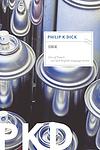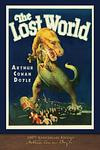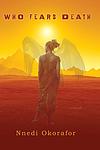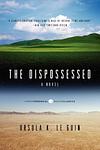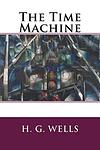The 100 Best Science Fiction Books of All Time
This is one of the 300 lists we use to generate our main The Greatest Books list.
-
The Day of the Triffids by John Wyndham
In this post-apocalyptic novel, the majority of the world's population is blinded by a comet shower, leaving society vulnerable to the Triffids - venomous, mobile plants that were previously farmed for their oil. The protagonist, who retains his sight after being hospitalized during the comet shower, must navigate this new world, dealing with the Triffids and the desperate remnants of humanity. The novel explores themes of survival, adaptation, and the inherent fragility of civilization.
The 618th Greatest Book of All Time -
Ubik by Philip K. Dick
Set in a futuristic world, the novel follows Joe Chip, a technician at a psychic agency, who becomes trapped in a reality-altering phenomenon after a mission on the Moon goes wrong. As his reality begins to unravel, Chip and his colleagues find themselves in a bizarre world where time seems to be moving backward and a mysterious product called "Ubik" appears to be the only thing that can save them. The book explores themes of reality, entropy, and human perception in a surreal and often humorous manner.
The 737th Greatest Book of All Time -
A Clockwork Orange by Anthony Burgess
This novel follows the life of a violent young man named Alex, who is part of a youth subculture in a dystopian future England. Alex and his gang engage in a nightmarish spree of rape, assault, and robbery, until he is arrested and subjected to a psychological experiment by the government to "cure" him of his violent tendencies. The novel explores themes of free will, morality, and the nature of evil, while using a unique slang language invented by the author.
The 87th Greatest Book of All Time -
Altered Carbon by Richard Morgan
This novel is a gripping foray into a future where human consciousness can be stored digitally and transferred between bodies, known as "sleeves." The story follows Takeshi Kovacs, a former elite soldier turned private investigator, who is hired to solve a wealthy man's murder. As Kovacs delves into the case, he navigates a world of corporate intrigue, futuristic technology, and morally ambiguous choices. The narrative explores themes of identity, mortality, and the essence of humanity, set against a backdrop of cyberpunk noir and visceral action.
The 10384th Greatest Book of All Time -
Utopia by Thomas More
This book is a fictional work that presents a detailed description of an ideal society on an imaginary island located in the Atlantic Ocean. The narrative is presented as a dialogue between the author's character and a traveler who has visited the island. The society described is devoid of private property, with citizens living in communal dwellings, and it promotes education, religious tolerance, and a welfare state. The book explores political, social, and religious customs, providing a critique of European society and offering an alternative model of social organization.
The 857th Greatest Book of All Time -
The Lost World by Arthur Conan Doyle
"The Lost World" is an adventure novel that follows a group of explorers as they embark on a perilous journey to a remote plateau in South America, where prehistoric creatures still roam. Led by an eccentric professor, the team encounters dangerous dinosaurs, hostile tribes, and treacherous terrain, testing their courage and resilience. As they strive to survive and document their discoveries, the explorers face thrilling encounters and unexpected challenges that push them to their limits. This thrilling tale of exploration and survival is filled with suspense, action, and a sense of wonder as the characters navigate the mysteries of this lost world.
The 2387th Greatest Book of All Time -
The Rediscovery Of Man by Cordwainer Smith
This book is a comprehensive collection of science fiction short stories that explore the vast and intricate universe of the Instrumentality of Mankind. Set in a future where humanity has reached the stars and undergone profound transformations, both biological and societal, the stories delve into themes of identity, morality, and the essence of what it means to be human. Through tales of engineered animals serving as companions to humans, to the rediscovery of lost cultures and the exploration of deep psychological and ethical dilemmas, the collection offers a rich tapestry of speculative fiction that challenges the reader to ponder the future of human civilization and our place in the universe.
The 9423rd Greatest Book of All Time -
Who Fears Death by Nnedi Okorafor
This novel is a coming-of-age narrative set in a post-apocalyptic Africa. It follows the journey of a young woman born from a violent act, who is prophesied to bring an end to a brutal regime. As she grows, she discovers her magical abilities and must learn to control them in order to fulfill her destiny. The narrative explores themes of race, gender, and power, while incorporating elements of African mythology and culture.
The 4856th Greatest Book of All Time -
We Were Out Of Our Minds With Joy by David Marusek
In "We Were Out Of Our Minds With Joy," readers are transported into a future where humanity has mastered the art of cloning and virtual reality, radically altering societal norms and personal relationships. The narrative follows the life of a couple as they navigate the complexities of love, identity, and existence in this new world order. The story delves into themes of immortality, the essence of individuality, and the impact of technological advancements on human connections, presenting a thought-provoking exploration of the potential future of human civilization. Through its intricate plot and richly developed characters, the book offers a compelling vision of a future where the boundaries between the real and the artificial become increasingly blurred.
The 10158th Greatest Book of All Time -
The Word For World Is Forest by Ursula K. Le Guin
"The Word For World Is Forest" is a thought-provoking science fiction novel that explores the consequences of human colonization and exploitation of a peaceful forest planet inhabited by the indigenous Athsheans. As the humans ruthlessly exploit the planet's resources and enslave the Athsheans, a group of Athshean rebels rise up to fight for their freedom, leading to a clash of cultures and an examination of the destructive nature of imperialism and the importance of respecting the environment and the rights of other beings.
The 6934th Greatest Book of All Time -
Dune by Frank Herbert
Set in a distant future, the novel follows Paul Atreides, whose family assumes control of the desert planet Arrakis. As the only producer of a highly valuable resource, jurisdiction over Arrakis is contested among competing noble families. After Paul and his family are betrayed, the story explores themes of politics, religion, and man’s relationship to nature, as Paul leads a rebellion to restore his family's reign.
The 109th Greatest Book of All Time -
The Time Machine by H. G. Wells
A Victorian-era scientist invents a machine that allows him to travel through time. He first journeys to the year 802,701 A.D., where he encounters the Eloi, a society of small, elegant, childlike adults who live in harmony but lack curiosity and drive. He later discovers the Morlocks, a nocturnal, subterranean species who prey on the Eloi. After rescuing an Eloi named Weena, the protagonist loses his time machine and must devise a plan to recover it and return to his own time, all while exploring the social and evolutionary implications of the two distinct societies.
The 182nd Greatest Book of All Time -
The Fifth Season by N. K. Jemisin
A woman searches for her kidnapped daughter in a world ravaged by a catastrophic climate change event known as the Fifth Season. Simultaneously, the narrative follows a young girl with destructive powers and a man struggling to control his own similar abilities. The story explores themes of oppression, survival, and the destructive power of nature, all set in a dystopian world where the earth is constantly in flux, and society is strictly divided and controlled.
The 1253rd Greatest Book of All Time -
Nineteen Eighty Four by George Orwell
Set in a dystopian future, the novel presents a society under the total control of a totalitarian regime, led by the omnipresent Big Brother. The protagonist, a low-ranking member of 'the Party', begins to question the regime and falls in love with a woman, an act of rebellion in a world where independent thought, dissent, and love are prohibited. The novel explores themes of surveillance, censorship, and the manipulation of truth.
The 4th Greatest Book of All Time -
2001: A Space Odyssey by Arthur C. Clarke
This science fiction novel follows a voyage to Jupiter with the sentient computer HAL after the discovery of a mysterious black monolith affecting human evolution. Dealing with themes of existentialism, human evolution, technology, artificial intelligence and extraterrestrial life, it is a journey of discovery that takes a dangerous turn when the onboard computer begins to malfunction. The story is a complex mix of science, philosophy, and conjecture.
The 375th Greatest Book of All Time -
Twenty Thousand Leagues Under the Sea by Jules Verne
This classic science fiction novel follows the adventures of Professor Aronnax, his servant Conseil, and harpooner Ned Land as they are captured by the enigmatic Captain Nemo aboard the Nautilus, a technologically advanced submarine. As they journey 20,000 leagues under the sea, they encounter a variety of sea creatures and underwater phenomena. The narrative explores themes of exploration, scientific discovery, and man's relationship with nature.
The 273rd Greatest Book of All Time
Tor, 116 Books
This list, "The 100 Best Science Fiction Books of All Time," was curated by the team at Tor Online, a prominent platform for science fiction literature. In an initiative launched last year, they reached out to their audience, calling upon readers to nominate their favorite science fiction novels. The aim was to compile a definitive list that celebrates the richness and diversity of the science fiction genre, spanning its entire history up to the present day. The titles selected do not necessarily represent the most original, successful, challenging, or influential works in the field, acknowledging that such a collection could never be exhaustive or objective. Instead, the list stands as a broad cross-section of science fiction literature, including both timeless classics and notable contemporary works, intended to offer readers a comprehensive and inspiring exploration of the genre. The selection process, detailed by editor Markus Mäurer in a series of articles, underscores the collaborative effort between the editorial team and the genre's enthusiastic readership, making it a unique and representative compilation for enthusiasts and newcomers alike.
Added about 2 months ago.
This list has a weight of 18%. To learn more about what this means please visit the Rankings page.
Here is a list of what is decreasing the importance of this list:
- List: only covers 1 specific genre
- Voters: not critics, authors, or experts, but the books on the list were curated by critics/experts
- List: Creator of the list, sells the books on the list
- Voters: specific voter details are lacking
If you think this is incorrect please e-mail us at [email protected].

